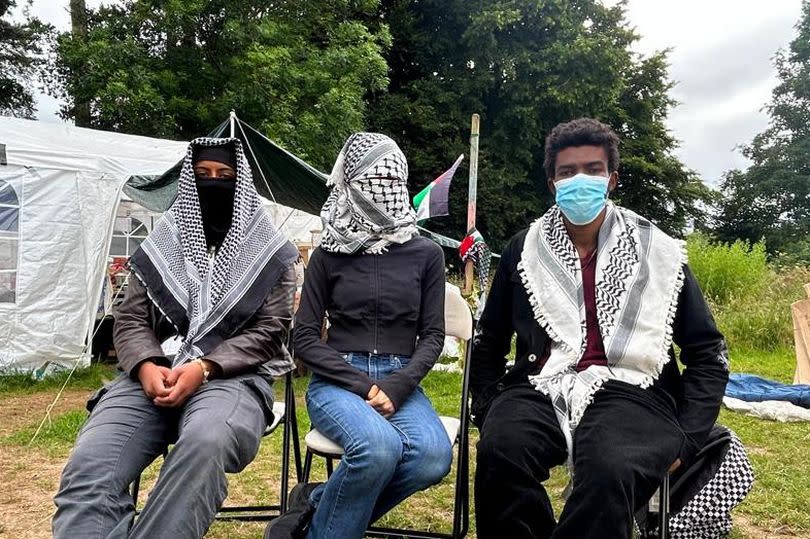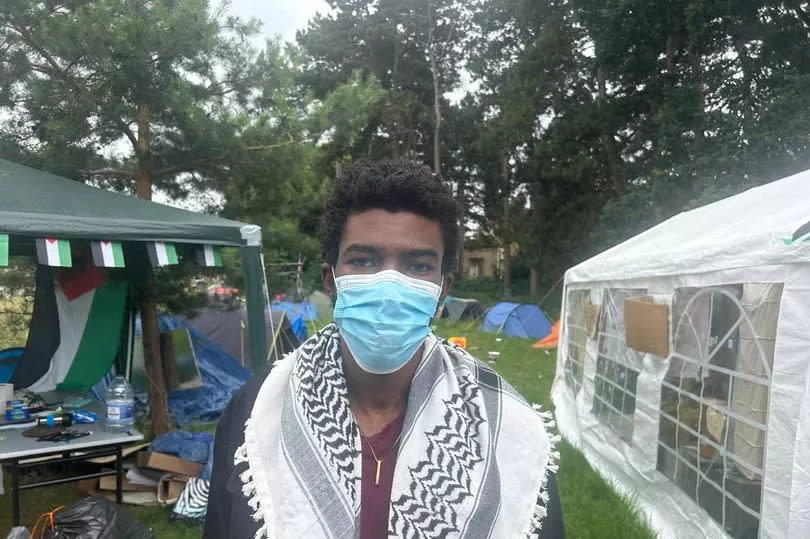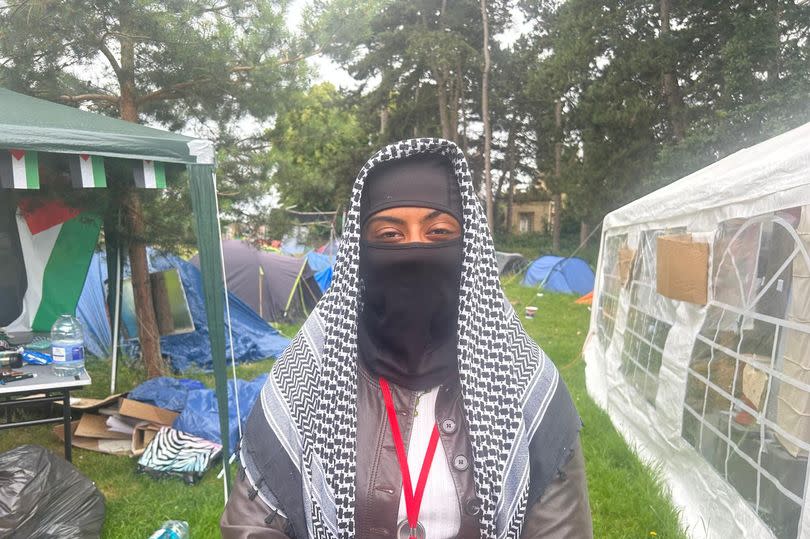No luxuries and little food - inside the University of Nottingham Palestine camp after two months

It's been more than 50 days since a small group of students set up tents on land inside the Jubilee Campus at the University of Nottingham. Quite how long they expected to be there is unclear; some on the outside gave it a week, or maybe two.
Nearly two months on, their fight continues. It's a fight against the very university that they study at - that they chose in the hope of fulfilling their life's goals and dreams - and its connections with arms companies BAE Systems and Rolls Royce amid their affiliation with Israel's ongoing action in Gaza.
They don't have to be here. But it's a choice they have carefully chosen to make, says one campmate, named Jay.
"If everyone had that mentality - that they can just support from the outside - then who would actually do this? Regardless of how hard it is, it'd be harder to feel like you're not doing anything at all."
She speaks with a fervour that could only be ascertained by a deep-rooted feeling of injustice. To preserve her anonymity, she does not explain what she studies.
A campmate, Abel, does. His degree is in medicinal and biological chemistry.
"If I don't do something, I feel silent and complicit," he explains.

His lectures and seminars have finished for the summer term now, but there are those here who still have exams to complete. It's 11am on a Monday morning when I arrive to speak to those who have volunteered; many are still asleep.
There are between 30 and 50 campmates overall, explains Leila, a philosophy student who came to Nottingham from east London to study. Her role is a key one; she often acts in an organisational role and speaks on the microphone at rallies, both at the university and across the city.
When she first came, one of her good friends was a Palestinian international student. She has a duty to be here, she says - "if you can, you should."

On the campsite are the residential tents, as well as two larger tents for food and rest, and a gazebo. Within the rest tent there are two people sleeping; people also use it to pray and to revise in.
There's no fridge, so the group keep a large supply of non-perishable items to eat for the most part. But their evening meals are often catered by people from the local area, who bring pre-made meals or cook for them onsite.
The community has been extremely kind to them, they say. It's a symbiotic relationship; those on the outside provide food and support, and those on the inside provide a safe space and a welcome haven.
One frequent visitor is a Palestinian woman, says Leila, on whose street homes are adorned with Israeli flags. She wants to put a Palestine flag up; she says her landlord won't let her.
Children with their families are also frequent visitors. "There was one boy who told us it makes him sad that he's from Palestine when we first met him," explains Jay.
"Now, he comes in bracelets with the flag on, and tells us what he's learnt about Palestine. He's not even ten years old. We've given him this space to be proud of who he is."
The community feel developed by the encampment does not extend only to those with Palestinian interests.
In the midst of our conversation, a local man, Tommy, stops by with a friend. He's asking for Zola, one of the camp members, whom he explains helped get him to hospital when he passed out on the street recently. He wants to say thank you.
Later on, a man, who Leila says has had a "rough time of it", stops by with a letter for her. The contents of it are private.
But she explains that he is often on the campsite, where he feels included, despite not being a student, or having links to the university. Students, stumbling home from the Rose & Crown pub next door, stop by to say how important they feel the job that the campers are doing is.
Moments like those make this new life worthwhile for the campers. It's an indefinite one, and that's why sometimes they need those boosts, because at times, it is hard.
"We're all so unbelievably exhausted and burnt out," says Leila. "Looking after each other has become a job for everyone."
"There have been tears," adds Jay. "It's created a battle within me. I need to do what I know is right but at the same time, I don't want to end up homeless or losing my degree."
When it rains, life on camp is made even harder. But it's a simple sacrifice when those here think of why they're doing this.
"Any time I've felt any kind of way about the difficulties of being on camp, I think about people in Palestine sitting with no shade in 50C heat after having their tents burnt to a crisp and their children inside killed," says Leila.
"As difficult as things have been this is such a privileged position to be in. There are 1.2 million refugees currently living in tents in their own homeland who don't have food, or the ability to reinforce their tents if it rains."
Ultimately, right now, there is no perceptible end in sight. The university, since beginning to engage in conversations with the group, says that it can't even consider divestment until 2025 at the earliest, due to committee meetings.
It won't stop those who remain here. "I'm hopeful," says Leila. "Tentatively hopeful."
The University's stake in its relations with BAE and Rolls Royce is worth around £43 million. But the figures are irrelevant to those who stay, and will stay, until change.
"People have the logic that there's no point when it comes to really difficult things all the time," says Abel. "But whenever there was change in history, someone had to start when it seemed impossible."
A University of Nottingham spokesperson said: "Our priority is the wellbeing of our staff and students and ensuring that the current protest remains peaceful. While respecting the right to protest, we are requesting that those involved are respectful of the needs of our wider community, particularly those who work and study on the site.
"We remain concerned that not everyone involved in the encampment is a member of our staff or student community as many of those taking part have opted to wear masks or otherwise hide their identities and this does limit our ability to keep our community safe.
"We have held two meetings with the group and have set out a timetable for considering issues raised by the Students Union. The camp can also submit issues for consideration as part of this process.
"The timescales required to properly consider the asks from the encampment are based on university governance processes, but we will be progressing these discussions within agreed timelines. We also have rigorous policies in place that guide the way we conduct research, our partnerships, investments and donations."

 Yahoo News
Yahoo News 
